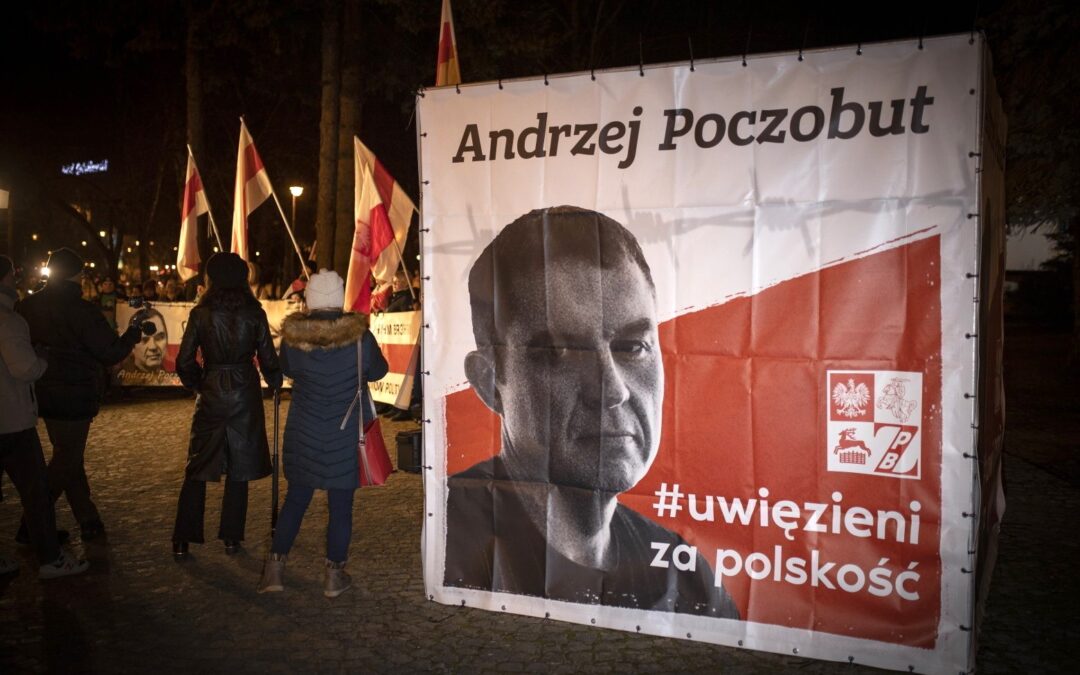Poland has imposed sanctions on 365 Belarusian individuals, including one of President Alexander Lukashenko’s sons, and 20 companies in response to last week’s decision by Belarus’s Supreme Court to uphold the eight-year prison sentence given to a leading figure from the country’s ethnic Polish minority.
The individuals will be banned from entering the Schengen area and their economic resources will be frozen. Warsaw has also implemented a ban on Belarusian and Russian trucks entering Polish territory at the border with Belarus.
Zgodnie z zapowiedzią zdecydowałem o wpisaniu na listę sankcyjną 365 obywateli 🇧🇾 oraz o zamrożeniu środków finansowych i gospodarczych 20 podmiotów i 16 innych osób powiązanych głównie z kapitałem 🇷🇺. Szczegóły w komunikacie: https://t.co/GZ2eX6zs5i
— Mariusz Kamiński (@Kaminski_M_) May 29, 2023
As well as Viktor Lukashenko, who is head of Belarus’s Olympic committee, others added to the sanctions list include the head of the Belarusian KGB intelligence agency, the prosecutor general, and the judge who pronounced the sentence on Polish activist and journalist Andrzej Poczobut.
Poczobut, one of the leaders of the Union of Poles in Belarus (ZPB), was detained in 2021 along with other community leaders as part of a clampdown by the Belarusian authorities on the Polish minority. He was then sentenced earlier this year to eight years in prison for “inciting hatred”.
Although in April, Belarus exonerated another Polish union leader, Angelika Borys, last week the Supreme Court upheld the sentence against Poczobut. The journalist will now be sent to a penal colony after already spending more than two years in custody.
A Belarusian court has sentenced Andrzej Poczobut – a leading figure in Belarus’s ethnic Polish community and an independent journalist – to eight years in prison.
Poland called the verdict "an inhumane decision by the Belarusian regime"https://t.co/CNIAgj0LUw
— Notes from Poland 🇵🇱 (@notesfrompoland) February 8, 2023
A further 76 judges and seven prosecutors have also been sanctioned by Poland, which says they were involved in the repression of pro-democracy protests as well as “physical and psychological torture, beatings, intimidation and discrimination against the Polish minority”.
Others sanctioned by Poland include 159 parliamentarians, which means that now all of the members of the Belarusian parliament are on the sections list. A number of sports figures, including former Barcelona and Arsenal footballer Alexander Hleb, have also been added to the list.
“These individuals promoted the Belarusian regime and were involved in legitimising and supporting the repressive policies of the authorities in Minsk,” says Poland’s interior minister.
Yesterday, interior minister Mariusz Kamiński also published a regulation banning trucks and trailers registered in Belarus and Russia from entering Poland from Belarus from 1 June.
Poland has announced the indefinite closure of its main border crossing with Belarus, citing “state security”.
It is also preparing further sanctions against Belarusian officials in response to yesterday’s jailing of an ethnic Polish leader by Belarus https://t.co/3nwJvmmbC4
— Notes from Poland 🇵🇱 (@notesfrompoland) February 9, 2023
Since a wave of protests emerged against Lukashenko’s proclaimed election victory in 2020, Poland has been among the leading international supporters of the Belarusian democratic opposition.
Meanwhile, Belarus has taken a number of repressive measures against its Polish community, which is around 300,000 strong according to official estimates but which Poland’s foreign ministry claims may number over a million.
As well as the detention of ethnic Polish leaders, for whose release Warsaw has called repeatedly, a Polish war cemetery was demolished and a historic mural was painted over in a Polish church.
The Belarusian authorities have also orchestrated a crisis on the border with Poland, where they have helped tens of thousands of people – mainly from the Middle East, Asia and Africa – try to cross illegally into the European Union.
A group of Syrian and Iraqi asylum seekers – many of them children – are “trapped” on the Polish-Belarusian border, having faced violence in Belarus but unable to enter Poland, according to activists.
Poland’s human rights office has visited the group https://t.co/S0b9NqxEbd
— Notes from Poland 🇵🇱 (@notesfrompoland) May 29, 2023
Main image credit: Grzegorz Dąbrowski / Agencja Wyborcza.pl

Alicja Ptak is deputy editor-in-chief of Notes from Poland and a multimedia journalist. She has written for Clean Energy Wire and The Times, and she hosts her own podcast, The Warsaw Wire, on Poland’s economy and energy sector. She previously worked for Reuters.




















